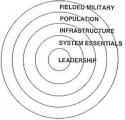...rather than use the more than $7 billion in U.S. military aid to bolster its counter-terrorism capabilities, Pakistan has spent the bulk of it on heavy arms, aircraft and equipment that U.S. officials say are far more suited for conventional warfare with India, its regional rival.
That has left fighters with the paramilitary force, known as the Frontier Corps, equipped often with little more than "sandals and bolt-action rifles," said a senior Western military official in Islamabad, even as they face Al Qaeda and Taliban fighters equipped with assault rifles and grenade launchers.
The arms imbalance has contributed to Al Qaeda's ability to regroup in the border region, and reflects the competing priorities that were evident even before this weekend between two countries that are self-described allies in the "war on terrorism" but have sharply divergent national security interests.
U.S. officials have urged Pakistan to move more aggressively against militants and bolster the capabilities of the Frontier Corps, an indigenously recruited force of about 80,000 troops, half of them based in the tribal areas, that was formed under British rule and is traditionally used to guard the border and curb smuggling.
Even front-line units with upgraded weapons are woefully unschooled in counterinsurgency tactics, other officials said. Late last month, Islamic militants captured dozens of fighters and paraded them before Western journalists...







 so that is new.
so that is new.


Bookmarks